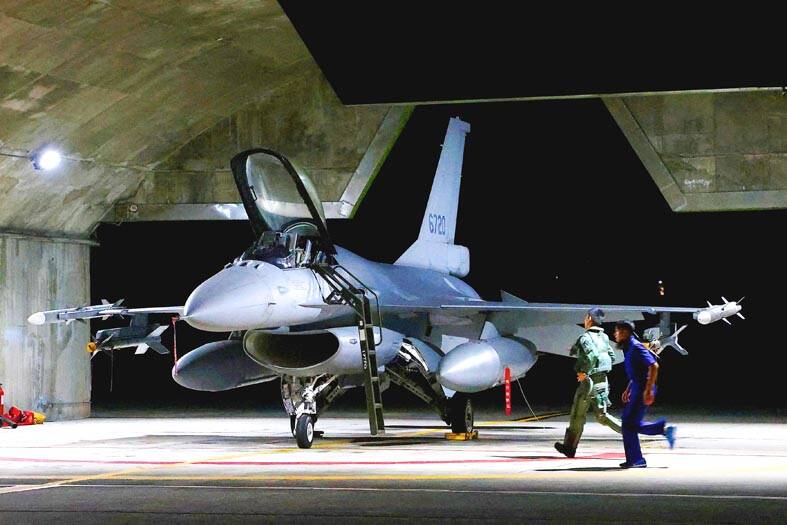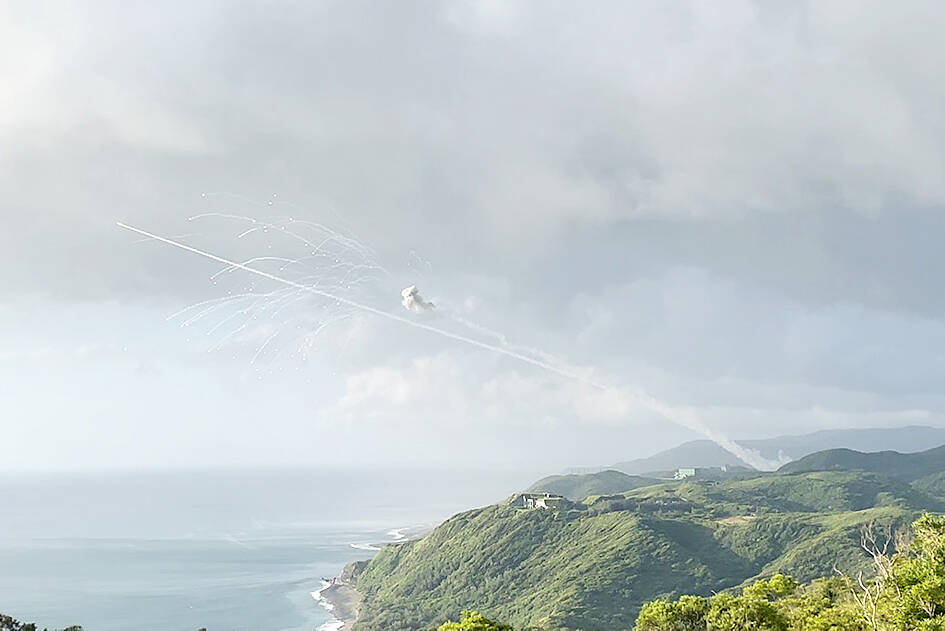Air force Chief of Staff General Tsao Chin-ping (曹進平) confirmed local media reports that a US-made MIM-104F Patriot (PAC-3) missile fired during a drill early yesterday prematurely exploded before it hit the target.
Tsao said the air force and the military’s top research unit, the Chungshan Institute of Science and Technology, were still investigating the cause of the explosion.
Local media reports said it was the first time a Patriot missile bought from the US had exploded on its own before hitting its target during firing tests that are conducted in Taiwan every two years.

Photo: Ann Wang, Reuters
Separately, the air force apologized to the Coast Guard Administration after one of its F-16 jets badly missed its target during a training session on Wednesday last week and dropped a bomb too close to a coast guard vessel.
An F-16V jet missed its target at sea and dropped a 907kg MK-84 bomb in waters near Pingtung County’s Jioupeng military base, Tsao told a regular briefing.
The bomb sent off a shock wave that affected a crewed coast guard vessel, although no casualties were reported, because the bomb landed several nautical miles from the vessel, he said.

Photo: Tsai Tsung-hsien, Taipei Times
The air force has apologized to the Coast Guard Administration and would punish the pilot, as well as his instructor, for failing to properly supervise the bomb drop drill, Tsao said.
Tsao’s apology came after local media reported on the incident late on Monday after several coast guard members complained on social media that they had to seek medical attention because of the shock wave caused by the bomb.
Tsao also confirmed that the air force has not listed a budget for the Beechcraft T-34C trainer replacement program.
The service life of the airframes of Taiwan’s T-34 fleet would not expire for many years and the requirements for their replacement has not yet been determined, he said.
Meanwhile, the Ministry of National Defense yesterday said reports that the navy overspent its ship fuel budget by NT$4 billion (US$125.25 million) were untrue, adding that the funds allocated for fuel would be increased to NT$11 billion next year.
Local media on Monday reported that the navy had exceeded its budget for fuel as it had needed to mount frequent sorties in response to aggressive ship movements by the Chinese People’s Liberation Army Navy in waters around Taiwan.
The ministry has approved a NT$7.1 billion ship fuel budget for the navy, which has not been exceeded this year, Rear Admiral Chen Chun-chung (陳春忠), chief of the Material Readiness Section at the Office of the Deputy Chief of the General Staff for Logistics, told a routine news conference in Taipei.
Should funding run out, the navy can apply to use available funding reserves in accordance with regular procedures, he said.
Additional reporting by Jonathan Chin

A Ministry of Foreign Affairs official yesterday said that a delegation that visited China for an APEC meeting did not receive any kind of treatment that downgraded Taiwan’s sovereignty. Department of International Organizations Director-General Jonathan Sun (孫儉元) said that he and a group of ministry officials visited Shenzhen, China, to attend the APEC Informal Senior Officials’ Meeting last month. The trip went “smoothly and safely” for all Taiwanese delegates, as the Chinese side arranged the trip in accordance with long-standing practices, Sun said at the ministry’s weekly briefing. The Taiwanese group did not encounter any political suppression, he said. Sun made the remarks when

PREPAREDNESS: Given the difficulty of importing ammunition during wartime, the Ministry of National Defense said it would prioritize ‘coproduction’ partnerships A newly formed unit of the Marine Corps tasked with land-based security operations has recently replaced its aging, domestically produced rifles with more advanced, US-made M4A1 rifles, a source said yesterday. The unnamed source familiar with the matter said the First Security Battalion of the Marine Corps’ Air Defense and Base Guard Group has replaced its older T65K2 rifles, which have been in service since the late 1980s, with the newly received M4A1s. The source did not say exactly when the upgrade took place or how many M4A1s were issued to the battalion. The confirmation came after Chinese-language media reported

The Taiwanese passport ranked 33rd in a global listing of passports by convenience this month, rising three places from last month’s ranking, but matching its position in January last year. The Henley Passport Index, an international ranking of passports by the number of designations its holder can travel to without a visa, showed that the Taiwan passport enables holders to travel to 139 countries and territories without a visa. Singapore’s passport was ranked the most powerful with visa-free access to 192 destinations out of 227, according to the index published on Tuesday by UK-based migration investment consultancy firm Henley and Partners. Japan’s and

BROAD AGREEMENT: The two are nearing a trade deal to reduce Taiwan’s tariff to 15% and a commitment for TSMC to build five more fabs, a ‘New York Times’ report said Taiwan and the US have reached a broad consensus on a trade deal, the Executive Yuan’s Office of Trade Negotiations said yesterday, after a report said that Washington is set to reduce Taiwan’s tariff rate to 15 percent. The New York Times on Monday reported that the two nations are nearing a trade deal to reduce Taiwan’s tariff rate to 15 percent and commit Taiwan Semiconductor Manufacturing Co (TSMC, 台積電) to building at least five more facilities in the US. “The agreement, which has been under negotiation for months, is being legally scrubbed and could be announced this month,” the paper said,